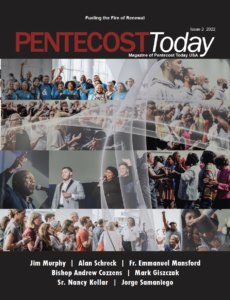Meditation and Questions for Reflection or Group Discussion
Mass Readings:
1st Reading: Wisdom 12:13, 16-19
Responsorial: Psalm 86:5-6, 9-10, 15-16
2nd Reading: Romans 8:26-27
Gospel: Matthew 13:24-43
Yielding to the Work of the Holy Spirit in Our Lives
The Spirit comes to the aid of our weakness. (Romans 8:26)
St. Paul spends much of the eighth chapter of his Letter to the Romans teaching about the Holy Spirit. Yet for all of Paul’s words, the Holy Spirit can often be an afterthought in our daily lives.
What does the Spirit do? Paul says that the Spirit is our source of life (Romans 8:11, 13). He says that the Spirit lives in us and shows us how to live for God (8:4-6, 9). He says that the Spirit reminds us that we are God’s children (8:16). Best of all, he says that the Holy Spirit “comes to the aid of our weakness” (8:26).
We all have weaknesses, don’t we? One weakness we face is the way we respond to suffering or hardship. Temptation, sickness, addiction, division in families, financial problems, natural disaster—any of these challenges can leave us fearful and overwhelmed if we try to face them on our own. But with the help of the Spirit, we can start to see things from God’s perspective and find the strength we need to keep moving forward.
Another weakness can be our struggle with prayer. The Spirit loves to help us pray! He helps us speak to God from our hearts and not just through rote prayers. He gives us a desire to pray for our loved ones. And he gives us the reassurance that our prayers have been heard.
It’s easy to think that it’s “just us”—that we are doing it all by ourselves. But this is just not true. Every holy thought that we have and every loving action that we take have their origin in the Holy Spirit. Every day, in good times and bad, the Spirit is with us, teaching us to ask God for what we need and filling us with grace.
So when you find the strength to push onward in a trying time, a renewed desire to love people, or a new insight into how to solve a problem, rejoice! It’s the Holy Spirit coming to your aid.
“Come, Holy Spirit!”
Download this reflection with discussion questions here.
(Many thanks to The Word Among Us for allowing us to use meditations from their monthly devotional magazine. Used with permission. For more information on how to subscribe to their devotional magazine, go to www.wau.org).
Sunday, July 23, 2017
Questions for Reflection or Discussion:
- The first reading describes the attributes of God with these words: “There is no god besides you who have the care of all, that you need show you have not unjustly condemned. For your might is the source of justice; your mastery over all things makes you lenient to all. For you show your might when the perfection of your power is disbelieved; and in those who know you, you rebuke temerity. But though you are master of might, you judge with clemency, and with much lenience you govern us; for power, whenever you will, attends you. And you taught your people, by these deeds, that those who are just must be kind; and you gave your children good ground for hope that you would permit repentance for their sins.”
- What do these words mean to you regarding the attributes of God?
- Why is it important that our response to God’s mercy be “deeds” that are “just” and “kind” and filled with “hope”? In what way is there a conflict between justice and kindness in your life?
- In what ways do the first reading words relate to these words from James 2:13, “For the judgment is merciless to one who has not shown mercy; mercy triumphs over judgment”? Why do you think we have a tendency to demand justice from God for others and but mercy for ourselves? Why is this contrary to the Gospel?
- The responsorial psalm, like the first reading, also describes many of the attributes of God: “You, O LORD, are good and forgiving, abounding in kindness to all who call upon you” and “You, O LORD, are a God merciful and gracious, slow to anger, abounding in kindness and fidelity.”
- How does this psalm reflect God’s forgiveness, kindness, and mercy toward you, especially through the cross?
- We know that God forgives us when we confess our sins? How ready are you to forgive those who have wronged you?
- In the letter to the Romans, St. Paul tells us that the “Spirit comes to the aid of our ”
- How often during the day do you turn to the Holy Spirit, present in each baptized Catholic, to “come to the aid” in your “weakness”? How often do you seek his help and guidance?
- Is it sufficient? If there is room for improvement, what steps can you take to improve it?
- In the Gospel reading, Jesus presents three parables to describe what the “kingdom of heaven” is like: one regarding wheat and weeds, another about a mustard seed, and the third one about yeast. In addition, they show that even the smallest of actions (e.g., the sowing of a mustard seed and the mixing of yeast with flour) can have a very large effect.
- In what ways do each of these parables describe what the kingdom of heaven is like?
- Do you see these parables as three independent ones, or are they related to one another? How?
- We often hear the phrase, “actions have consequences.” This is certainly true in each of the parables. What small actions do you think the Lord is asking you to take in your life that could have a major impact?
- These words begin the meditation: “St. Paul spends much of the eighth chapter of his Letter to the Romans teaching about the Holy Spirit. Yet for all of Paul’s words, the Holy Spirit can often be an afterthought in our daily lives.”
- The Holy Spirit is often called the forgotten person of the Trinity, or as the meditation says: “an afterthought in our daily lives.” Why do you think this is so?
- The meditation goes on to describe the work of the Holy Spirit, as St. Paul describes them in Romans 8: “Paul says that the Spirit is our source of life (Romans 8:11, 13). He says that the Spirit lives in us and shows us how to live for God (8:4-6, 9). He says that the Spirit reminds us that we are God’s children (8:16). Best of all, he says that the Holy Spirit ‘comes to the aid of our weakness” (8:26).’” The meditation ends with these words: “So when you find the strength to push onward in a trying time, a renewed desire to love people, or a new insight into how to solve a problem, rejoice! It’s the Holy Spirit coming to your aid.”
- Does St. Paul’s description of the work of the Holy Spirit in Romans 8 add anything to your own understanding of the Holy Spirit’s work in your life? How?
- In what specific ways have you experienced the work of the Holy Spirit in your life?
- Take some time now to pray for a fresh infilling of the Holy Spirit and for the grace to fully yield to the work of the Holy Spirit in your life. Use the prayer below from the end of the mediation as the starting point.
“Come, Holy Spirit!”
[The discussion questions were created by Maurice Blumberg, who is in partner relations for The Word Among Us Partners, (http://www.waupartners.org/); a ministry of The Word Among Us (www.wau.org) to the military, prisoners, women with crisis pregnancies or who have had abortions, and college students. He is also a member of the National Service Committee Council of the Catholic Charismatic Renewal (https://www.nsc-chariscenter.org/) and a member of the board of directors of the Christlife Catholic Ministry for Evangelization (https://christlife.org/). Maurice was also the founding Executive Director of the National Fellowship of Catholic Men. He can be contacted


 Click Here for us to pray for your intentions through our new website.
Click Here for us to pray for your intentions through our new website. 
